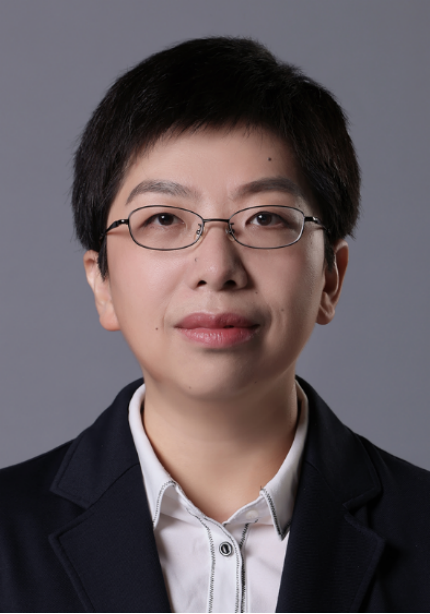Department of Pharmacology
Lu Tie

Lu Tie, Ph.D.
Associate Professor, Doctoral Supervisor
Deputy Director of Department, Principal Investigator
Contact Information
Email: tielu@bjmu.edu.cn
Address: Department of Pharmacology, School of Basic Medical Sciences, Peking University Health Science Center, Beijing 100191, China
Research Interests
Immunopharmacology, focusing on molecular targets for tissue injury repair and novel drug discovery
Professional Profile
Selected for Beijing Youth Talent Program. Principal investigator of multiple national, and has received grants from National Natural Science Foundation of China (NSFC), Beijing Natural Science Foundation, the Doctoral Program of Higher Education of China, and the Jansssen Research Council China Research Fund. Published 23 papers as first/corresponding author in prestigious international journals including Blood , Nature Communications , Acta Pharmaceutica Sinica B , and British Journal of Pharmacology . Total SCI publications exceed 50 with over 1,600 citations and an H-index of 27. Holds 5 authorized national invention patents. Author/editor of more than 20 textbooks and monographs. Currently serves as Vice Chairman/Secretary-General of Biochemical and Molecular Pharmacology Professional Committee, and Deputy Secretary-General of Traditional Chinese Medicine and Natural Medicine Pharmacology Professional Committee of Chinese Pharmacological Society. Recipient of Servier Young Investigator Award provided by Servier Institute and Chinese Pharmacological Society, Sanofi Young Investigator Award provided by Chinese Pharmaceutical Association and Sanofi, and the Peking University Luye Eminent Young Scholar Fellowship.
Education & Professional Experience
- 1999-2003: B.S. in Pharmacy, Peking University
- 2003-2008: Ph.D. in Molecular Pharmacology, Peking University Health Science Center
- 2007-2008: Visiting Scholar, Michigan State University, USA
- 2008-2012: Lecturer, Department of Pharmacology, School of Basic Medical Sciences, Peking University
- 2012-present: Associate Professor & Doctoral Supervisor, Department of Pharmacology, School of Basic Medical Sciences, Peking University
Teaching Courses
- Molecular Pharmacology (Graduate Course)
- Pharmacology (Undergraduate)
- Pharmacology Experiments (Undergraduate)
Research Team
Our team focuses on the regulatory mechanisms of tissue repair microenvironment and targeted intervention strategies. Tissue repair is a complex biological process in response to injury, and its dysregulation can lead to pathological outcomes such as chronic ulcers or tissue fibrosis. We are committed to elucidating the regulatory mechanisms of microenvironmental homeostasis during this process, employing multidisciplinary approaches including molecular pharmacology, gene-edited animal models, omics, and computational biology. We explore strategies targeting GPCR signaling, mitochondrial dynamics, and metabolic-epigenetic interactions to reconstruct microenvironmental homeostasis and provide precise therapeutic strategies for tissue repair.
Research Funding (as Principal Investigator)
- National Natural Science Foundation of China General Program (No. 81974506), 2026.01-2029.12
- Key Research and Development Project of Xinjiang Uygur Autonomous Region (No. 2023290141), 2023.12-2027.12
- National Natural Science Foundation of China Major Research Plan Cultivation Project (No. 92168120), 2022.01-2024.12
- Beijing Natural Science Foundation Key Research Project (No. Z200019), 2020.10-2024.10
- National Natural Science Foundation of China General Program (No. 81974506), 2020.01-2023.12
Representative Publications (*Corresponding Author)
1. Zhang Linqi#, Che Changxiao#, Du Yaqin#, Han Lulu, Wang Jiale, Zhang Chenyu, Huang Shenming, Zheng Zhongyuan, He Qingtao, Yang Zhao, Zhang Long, Chen Nan, Yang Fan, Jia Yingli, Zhao Shimin, Zhou Demin, Wang Chu, Wang Xian, Sun Jinpeng*, Tie Lu*. N-homocysteinylation of β-arrestins biases GPCR signaling and promotes platelet activation. Blood. 2025 Feb 10:blood.2024025593. (IF 21.1, Q1, Last corresponding author)
2. He Yao#, Yang Xue#, Zhang Chenyu#, Deng Min#, Tu Bin#, Liu Qian, Cai Jiaying, Su Li, Yang Zhiwen, Xu Hongfeng, Ma Qun, Zheng Zhongyuan, Zhang Ying, Wang Xi, Li Xuejun, Li Linlin*, Huang Yongzhuo*, Tie Lu*. Ablation of macrophage transcriptional factor FoxO1 protects against ischemia-reperfusion injury-induced acute kidney injury. Acta Pharmaceutica Sinica B. doi.org/10.1016/apsb.2025.04.009. (IF 14.8, Q1, Last corresponding author)
3. Huang Shenming#, Huang Zhizhen#, Liu Lei#, Xiong Mengyao#, Zhang Chao#, Cai Boyang#, Wang Mingwei#, Cai Kui, Jia Yingli, Wang Jiale, Zhang Minghui, Xie Yihe, Li Min, Zhang Hang, Weng Chenghao, Wen Xin, Li Zhi, Sun Ying, Yi Fan, Yang Zhao, Xiao Peng, Yang Fan, Yu Xiao, Tie Lu*, Yang Baoxue*, Sun Jinpeng*. Structural insights into the mechanisms of urea permeation and distinct inhibition modes of urea transporters. Nat Commun. 2024 Nov 26;15(1):10226. (IF 14.7, Q1, Co-corresponding author)
4. Huyan Tianru#, Fan Lu#, Zheng Zhongyuan#, Zhao Jinghui, Han Zhenru, Wu Pin, Ma Qun, Du Yaqin, Shi Yundi, Gu Chunyan, Li Xuejun, Wang Wenhui, Zhang Long*, Tie Lu*. ROCK1 inhibition improves wound healing in diabetes via RIPK4/AMPK pathway. Acta Pharmacol Sin. 2024 Jul;45(7):1477-1491. (IF 6.9, Q1, Co-corresponding author)
5. Wang Di, Wang Yanqing, Zou Xiantong, Shi Yundi, Liu Qian, Huyan Tianru, Su Jing, Wang Qi, Zhang Fengxue, Li Xuejun, Tie Lu*. FOXO1 inhibition prevents renal ischemia-reperfusion injury via cAMP-response element binding protein/PPAR-γ coactivator-1α-mediated mitochondrial biogenesis. Br J Pharmacol. 2020 Jan;177(2):432-448. (IF 9.473, Q1, Sole corresponding author)
Student Supervision
Has supervised more than ten doctoral and master's students. Multiple students have received honors including Peking University Outstanding Graduate. Graduates are engaged in research and development in universities, hospitals, pharmaceutical companies, and other institutions.

